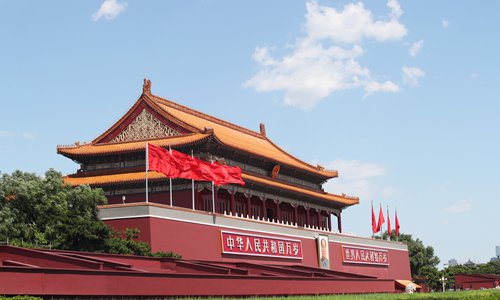HOME >> OPINION
China and world can learn from each other
By Wang Wen Source:Global Times Published: 2019/8/19 20:18:39

Photo: IC
Working in a university, professors often face a hard subject - learning from students. It is not an easy thing to do for the academics, nonetheless they must do it. It is hard for academics not to act authoritatively in front of their students. This is easy to understand. After all, professors have higher education degrees and more published papers. On top of that, they have read more books. But students have obvious merits as well. My own experience is that teachers will gain reputation more easily if they act modestly and interact with students. However, not many professors are able to do so.
This is not a common failing only for professors. It may apply to countries too. In 2014, Chinese President Xi Jinping said that China will be a major power which always learns from others. But as the second-largest economy in the world, China tends to say that it is willing to share its development experience with the world.
Indeed, China has confidence to say so. High-speed railways, highways, electronic payment, sharing economy and 5G technology have made the Chinese society convenient and efficient in recent years. Quite a few people in the international community admire China. But this does not mean that China can be proud of itself forever.
Many European airports have done away with manually checking boarding passes. These airports have instead used automatic security scanning equipment. Compared with Chinese airports, such practices in European airports are faster, more convenient and need less manpower. In many international metropolises such as Singapore and Tokyo, there are usually corridors or underpasses between buildings. People do not need to expose themselves to the sun and rain to shuttle. They are also more convenient and livable than many Chinese cities. Consequently, although China has gained international advantage in macro interconnection, the country still has much to learn from other countries in the details of micro interconnection.
Another example is environmental protection. In recent years, China has made great progress in improving the quality of air, water and soil. But compared with many European countries and the US, China still has a long way to go. Sanitation at many Chinese tourist attractions is often criticized. I have been to Mount Kilimanjaro in Africa. What surprised me was that toilets at a camp at 4,700 meters above sea level were carefully cleaned and no trash could be seen along the 50-kilometer-long climbing route. We can learn scenic spot management from some developing countries.
Take Chinese food as another example. Many foreigners have become fans of Chinese cuisine. More and more Chinese restaurants have taken root in cities such as London, New York, Paris and Milan selling snacks like roujiamo (meat sandwiches) and jianbing guozi (Chinese-style pancake). I have tried these restaurants and surprisingly found that some cooks are not Chinese. They do the cooking with standardized process, using utensils that are cleaner than those used in many small restaurants in China. This is also worth learning from.
We should attach importance to not only details of development but also developed countries' major strategy for development.
When the world was hit by financial crisis in 2008, the US was believed to be on decline. After 11 years, the US still leads the world in science and technology innovation and in financial strength. But many emerging countries that were once prepared to have a good laugh at the US have run into severe risks. China should make amends and may as well learn from the US in how to get an ace up its sleeve and how to right the wrong in the international game.
Chinese people are familiar with the idiom: Modesty helps one make progress while conceit makes one lag. The competition about national strength to some extent can be viewed as one of learning capability. Xi reiterated in March 2019 that young and middle-aged officials must "stay true to mission" and constantly make progress. This is another important reminder to all Chinese people.
It is not easy to discover the merits of others and follow them. China in the transition period must keep in mind that only keeping learning and making progress will help it become one of the world's strongest countries.
Of course it should not be a taboo for other countries to learn from China, which has become a high-income country from a poor one in the past seven decades. Such change is worth learning from for the whole world.
All countries have encountered different problems. It will be in China's interest to figure a way out of domestic reform and governing difficulties by learning from one another. This is not necessarily easy but can yet be achieved.
The author is professor and executive dean of Chongyang Institute for Financial Studies, the deputy president of Silk Road School, Renmin University of China. His book Great Power's Long March Road was launched recently. opinion@globaltimes.com.cn
Posted in: COLUMNISTS,VIEWPOINT